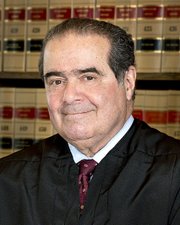Excerpts from the majority opinion of Chief Justice John Roberts and a dissent written by Justice Antonin Scalia in the Supreme Court ruling that upheld the tax subsidies underpinning the Affordable Care Act:
ROBERTS
"In a democracy, the power to make the law rests with those chosen by the people. Our role is more confined, to say what the law is. That is easier in some cases than in others. But in every case we must respect the role of the Legislature and take care not to undo what it has done. ... Congress passed the Affordable Care Act to improve health insurance markets, not to destroy them. If at all possible, we must interpret the Act in a way that is consistent with the former and avoids the latter."
"The Affordable Care Act contains more than a few examples of inartful drafting. (To cite just one, the Act creates three separate Section 1563s.) Several features of the Act's passage contributed to that unfortunate reality. Congress wrote key parts of the Act behind closed doors, rather than through the traditional legislative process. And Congress passed much of the Act using a complicated budgetary procedure known as 'reconciliation,' which limited opportunities for debate and amendment, and bypassed the Senate's normal 60-vote filibuster requirement. As a result, the Act does not reflect the type of care and deliberation that one might expect of such significant legislation."
"We have held that Congress does not alter the fundamental details of a regulatory scheme in vague terms or ancillary provisions. But in petitioners' view, Congress made the viability of the entire Affordable Care Act turn on the ultimate ancillary provision: a sub-sub-sub section of the Tax Code. We doubt that is what Congress meant to do. Had Congress meant to limit tax credits to State Exchanges, it likely would have done so in the definition of 'applicable taxpayer' or in some other prominent manner. It would not have used such a winding path of connect-the-dots provisions about the amount of the credit."
The tax credits "are necessary for the Federal Exchanges to function like their State Exchange counterparts, and to avoid the type of calamitous result that Congress plainly meant to avoid."
SCALIA
"Under all the usual rules of interpretation ... the government should lose this case. But normal rules of interpretation seem always to yield to the overriding principle of the present Court: The Affordable Care Act must be saved."
"Today's interpretation is not merely unnatural; it is unheard of. Who would ever have dreamt that 'Exchange established by the State' means 'Exchange established by the State or the Federal Government'?"
"We should start calling this law SCOTUScare."
"Perhaps the Patient Protection and Affordable Care Act will attain the enduring status of the Social Security Act or the Taft-Hartley Act; perhaps not. But this Court's two decisions on the Act will surely be remembered through the years. The somersaults of statutory interpretation they have performed ... will be cited by litigants endlessly, to the confusion of honest jurisprudence. And the cases will publish forever the discouraging truth that the Supreme Court of the United States favors some laws over others, and is prepared to do whatever it takes to uphold and assist its favorites."
A Section on 06/26/2015


